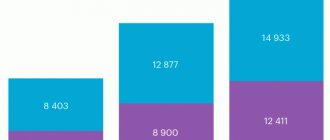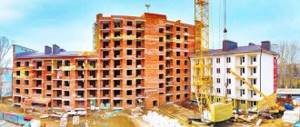Termination of a shared construction agreement at the initiative of the shareholder unilaterally
If you decide to take this step, there must be good reasons. The law clearly states the grounds for termination of the DDU (Article 9 of the Federal Law “On participation in shared-equity construction of apartment buildings” dated December 30, 2004 No. 214-FZ). Namely:
- at the initiative of a participant in shared construction;
- at the initiative of the developer;
- by agreement of the parties;
- judicially.
However, it is worth considering that from 2021 Art. 9 No. 214-FZ was supplemented with a new paragraph. It states that the shareholder cannot terminate the contract unilaterally out of court if the developer fulfills its obligations for shared construction and complies with all current requirements of Federal Law.
If you, as a participant in shared construction, have changed your mind about buying housing from a construction company with which all the paperwork has already been completed, then you have the right to terminate the shared ownership agreement at any stage of construction, even if the developer properly fulfills its obligations. Penalties cannot be applied to such “refuseniks” , since this requirement does not comply with the provisions of Art. 32 of the Law of the Russian Federation dated 02/07/1992 No. 2300-1 “On the protection of consumer rights.”
There is also the option of assigning rights to an apartment to a third party, which is the most financially beneficial for the participant in shared construction - the money is “returned” immediately upon conclusion of the transaction. Upon termination, the return of money may be delayed, which may lead to legal proceedings.
Termination of the DDU is subject to state registration in Rosreestr. The Tax Code of the Russian Federation provides for the following amount of state duty when the DDU is broken:
- upon agreement of the parties, the state duty is 350 rubles (clause 30, part 1, article 333.33 of the Tax Code of the Russian Federation);
- unilaterally or judicially - no state duty is charged.
Depending on why the participant decided to terminate the contract, the law provides two ways:
- in a pre-trial manner;
- judicial procedure.
- If the delay in delivery of the object is more than 2 months from the date established by the contract.
- The property has construction defects that the developer did not eliminate within the time period specified by the shareholder, and also did not compensate the participant for independent repair work and did not reduce the contract price.
- During the acceptance of the apartment by the shareholder, deficiencies were discovered that significantly deteriorate the quality of the constructed housing and make it impossible to live in the premises.
- In other cases established by federal law or agreement.
- First, you need to draw up a notice of unilateral termination of the contract. It is necessary to indicate specific points violated by the developer, provide links to articles of the law, calculate the penalty that he must pay, and declare losses. You must attach your details for transferring funds to the notification.
- Send the completed notification to the developer's postal address by registered mail with a full list of the attachments.
Calculate the penalty in the calculator
The developer has twenty working days to return to the participant his funds paid under the agreement. He is also obliged to pay interest on this amount for the use of the specified funds, and to cover the losses of the shareholder. It should be noted that the penalty is calculated for the entire period of use of the shareholder’s funds (1/150 of the Central Bank rate for one day of the full amount of money deposited). If the money is not returned within the allotted time, then from the next day additional interest begins to accrue on this amount.
The legislation on shared construction strictly defines in what cases a participant in shared construction has the right to demand termination of the shared-share construction in court (clause 1.1 of Article 9 of the Federal Law No. 214-FZ):
- the construction of an apartment building has been suspended or terminated, and there are circumstances indicating a possible violation of the period established by the contract during which the object must be put into operation and transferred to the participant;
- a significant change in the design documentation of the construction project (layout), as well as an increase/decrease in the size of the apartment (area);
- The purpose of the common property of the house and the non-residential premises included in it has been changed.
If one of the above facts exists, it is necessary to apply to the court with a request for termination. The statement of claim must indicate the following requirements:
- return of the entire amount of money paid by the shareholder under the agreement;
- collection of interest on funds paid by the shareholder towards the contract price for the use of said funds. Interest is calculated at the main rate of the Central Bank (1/150 of the amount of DDU for one day);
- repayment of incurred expenses. This may include payment of interest on a mortgage loan, payment of a rented apartment, and other losses caused by the developer’s failure to fulfill its obligations;
- compensation for moral damage;
- compensation for all legal expenses, including legal fees.
After a court decision is made, the developer is obliged, within a period not exceeding ten working days, to pay the entire amount collected by the court. If the money is not transferred on time, then from the next day new interest on the unpaid amount begins to accrue.
If you need professional assistance from a lawyer on issues related to equity participation, you can contact us to review the contract, file a claim, or simply for professional advice.
Unilateral termination of the DDU by the construction company is possible only in one case: if the participant violates his obligations to pay for the housing under construction.
- the participant has not deposited funds for more than 2 months, if the conditions stipulate a one-time payment of the entire amount of the agreement (clause 4, article 5 of the Federal Law of December 30, 2004 No. 214-FZ);
- the shareholder systematically violates the payment schedule in installments specified in the DDU. A violation is considered in the following cases:
- the payment deadline was missed more than 3 times within 12 months;
- payment is overdue for more than 2 months.
Clause 3 art. 9 of Federal Law No. 214-FZ of December 30, 2004 provides for the procedure for termination of the contract by the developer:
- If the above grounds exist, the developer sends the shareholder a written notice (warning) of the need to repay the debt, and also indicates the consequences in case of failure to fulfill the requirement.
- After 30 days after sending the notice, the developer has the right to terminate the DDU in construction.
In the event of a unilateral refusal by the developer to fulfill the DDU, he is obliged to return the funds paid by the participant in shared construction towards the price of the contract within ten working days from the date of its termination.
The special norms established by Federal Law No. 214 “On participation in shared construction” provide a number of grounds for holding the parties to an agreement on participation in shared construction (in short - DDU) accountable for their guilty behavior.
We invite you to read: Is it necessary to register a lease agreement for non-residential premises? Types of leases and features of their design
In particular, failure by the parties to comply with the terms of the agreement and other violations of the requirements of the law entail termination of the agreement for participation in shared construction.
Article 9 of the Federal Law “On Participation in Shared Construction of Apartment Buildings” allows for the termination of a residential building both in an out-of-court notification procedure and in court. The parties can also come to a mutual agreement to terminate the contract, while stipulating the conditions and procedure for terminating the contract.
Depending on the relevant grounds, the law allows:
- Termination of DDU at the initiative of the shareholder
- Termination of DDU at the initiative of the developer
- Termination of DDU in court at the request of the shareholder
- Termination of DDU by agreement of the parties
First of all, we will consider in detail the grounds that allow a shareholder to unilaterally refuse to fulfill a contract for participation in shared construction.
So, the shareholder has the right to terminate the DDU unilaterally in the following cases:
- Delay in delivery of an apartment for two months or more. If the parties extended the period for delivery of the apartment by an additional agreement, then there must be a violation by the developer of the deadline established by the contract for the transfer of the construction project, taking into account the extension of this period
- Identification of significant deficiencies in a shared construction project, that is, when there are claims regarding the quality of the apartment (provided that the deficiencies are identified within the warranty period)
- Failure by the developer to comply with the shareholder's requirements for:
- 1) Free elimination of identified deficiencies within a reasonable time
- 2) A proportionate reduction in the purchase price of the object
- 3) Reimbursement of expenses for eliminating deficiencies by the shareholder himself
- Failure by the developer to comply with the requirements of the law on mandatory and timely notification of the shareholder about the early termination of the guarantee agreement, and on the timely conclusion of a new guarantee agreement, as provided for in Part 3 of Art. 15.1 FZ-214 (in cases where the fulfillment of the developer’s obligations under the DDU is secured by a bank guarantee)
- Other grounds provided by law or contract. For example, in the agreement the parties themselves may indicate other grounds that entail the unilateral refusal of the shareholder to fulfill the agreement
As practice shows, the most common cases are late delivery of apartments and non-compliance by developers with building codes, and as a result, delivery of apartments with defects and shortcomings.
So, the house was not delivered on time, significant shortcomings were found in the apartment, or the developer refuses to eliminate his shortcomings?
If, for these reasons, you want to terminate the contract for participation in shared construction and return the money for the apartment, you need to clearly understand the procedure for your actions.
The law regulates the following procedure for terminating a trust agreement in the event of a unilateral refusal by the shareholder to fulfill it:
- The shareholder must send the developer a written notice of unilateral refusal to fulfill the contract
- The notification must be sent by registered mail with a list of attachments
- The equity participation agreement is considered terminated from the day the notice is sent to the developer, that is, to terminate the agreement there is no need to go to court or wait for the letter to reach the developer
Termination of a shared construction contract
The general grounds for termination of a contract are typical for contracts under Russian law. Termination of a contract for participation in shared construction is possible: 1. By agreement of the parties. In this case, termination of the contract will mean that bilateral restitution will be applied, i.e. Each party will receive back what was paid under the agreement. The shareholder will receive the money back, and the developer will receive compensation for the amount of work that he managed to complete. 2. At the request of one of the parties to the agreement. Moreover, such a demand can be made by the developer or shareholder, and unilateral termination of the shared construction agreement can be made with the consent of the other party or by court decision. The specifics of terminating a shared construction contract come down to the fact that information about this legal fact must be entered into the Unified State Register. In addition, there is no standard contract and agreement to terminate such a contract.
Developer's response
Please note that the developer does not have the right to withhold part of the funds to be returned to the shareholder as a penalty to be collected from the shareholder for violation of payment under the DDU. Such offset is expressly prohibited by law (Part 7, Article 9, Federal Law-214).
The developer responds with a letter with a reasoned response and mutual requirements in simple written form, sent to the other party with notification and a receipt.
Call a lawyer
We will select a specialist for you
8 Moscow
8 SPb
Termination of DDU unilaterally
It is noteworthy that the main mechanism for protecting shareholders from the actions of unscrupulous developers is the termination of the agreement for participation in shared construction by unilateral notification.
The possibility of out-of-court termination of the contract relieves shareholders from lengthy litigation with the developer, and certainly simplifies a lot.
However, shareholders should not forget that the possibility of unilateral refusal to fulfill a shared construction agreement is also provided to developers in the event of a violation by the shareholder of the obligation to make timely payments under the agreement.
Assistance in terminating a share participation agreement. Tel. 7 (812) 989-47-47 Telephone consultation
In this section, we will consider in detail the judicial termination of an equity participation agreement.
Based on the content of the norms of Federal Law No. 214 “On participation in shared construction”, such a procedure for terminating the shared-equity agreement can be carried out at the request of the shareholder in case of guilty behavior of the developer.
A contract for participation in shared construction may be terminated in court in the following cases:
- The construction of an apartment building has been suspended (frozen) and it has become obvious that the house will not be completed and commissioned on time
- Construction of an apartment building has been stopped
- The design documentation of the facility under construction has changed significantly, including if the total area of the apartment has significantly decreased or increased. We must proceed from the fact that, by law, the actual area of an apartment can differ from the designed area by no more than 5%.
- The purpose of common and (or) non-residential premises in the house has changed
- Other cases provided for by law or contract
As you can see, the list of grounds for judicial termination of a shared ownership agreement is not closed, which means that an additional list can also be established by the share participation agreement itself.
Before going to court, it is advisable to send the developer a pre-trial demand for termination of the contract, return of funds and payment of interest.
Experienced lawyers for termination of DDU agreement. Tel. 7 (812) 989-47-47 Telephone consultation
The statement of claim to the court must be correctly drawn up and correctly filed with the court, that is, comply with the requirements of Articles 131-132 of the Civil Procedure Code of the Russian Federation.
The claim must state the circumstances that served as the basis for going to court, clearly state your demands, calculate the interest charged, and attach all the documents necessary for the consideration of the dispute.
Disputes between developers and shareholders - citizens - fall under the jurisdiction of courts of general jurisdiction. These are district courts if the value of the claim is over 50,000 rubles, and justices of the peace if the value of the claim is below the specified amount.
The rules of Article 29 of the Code of Civil Procedure of the Russian Federation on alternative jurisdiction apply to these disputes, which is due to the extension of the Law of the Russian Federation “On the Protection of Consumer Rights”.
This means that a statement of claim against the developer can be filed in court at the plaintiff’s choice:
- At the plaintiff's place of residence
- At the location of the developer (legal address)
- At the place of imprisonment or place of execution of pre-trial detention
This legal position is confirmed by the clarifications of the Supreme Court of the Russian Federation given in the “Review of the practice of resolving disputes by courts arising in connection with the participation of citizens in the shared construction of apartment buildings and other real estate”, approved by the Presidium of the Supreme Court of the Russian Federation on December 4, 2013
We invite you to read: Termination of the general contract does not affect the relationship of the parties under the subcontract
If the participant in shared construction is an organization, the claim is subject to consideration by the Arbitration Court at the location of the developer (unless the jurisdiction is changed by the agreement).
Payment of state duty
If the price of the claim does not reach 1,000,000 rubles, the state duty is not paid only for individuals)
If the value of the claim is over 1,000,000 rubles, the plaintiff must pay a state fee calculated in accordance with the requirements of the Tax Code of the Russian Federation.
These rules apply if the plaintiff is an individual.
Organizations are not exempt from paying state fees when going to court.
- A copy of the agreement on participation in shared construction with all additional agreements and annexes
- Copies of payment documents confirming payment under DDU
- Copies of claims and notices to the developer, documents confirming their sending to the developer, as well as the developer’s responses, if available
- Copies of other documents substantiating the plaintiff’s claim (for example, confirmation of a violation of the quality of construction - an apartment inspection report, an examination report, a defect sheet, etc.)
- Interest calculation
- Receipt for payment of state duty (if the value of the claim is more than 1 million rubles)
- The statement of claim, calculation and copies of attached documents are submitted according to the number of persons participating in the case.
If the claim for termination of the DDU is satisfied, the court also recovers from the developer in favor of the participant in shared construction the interest provided by law in the amount of 1/150 of the refinancing rate of the Bank of Russia.
Payment of money to the shareholder must be made by the developer within 10 days from the date of termination of the agreement for participation in shared construction.
The procedure for calculating interest and the responsibility of the developer in case of violation of payment terms is similar to the procedure established for unilateral termination of the contract.
Lawyer for the protection of shareholders in St. Petersburg. Tel. 7 (812) 989-47-47 Telephone consultation
Regardless of whose initiative the contract is terminated - the participant in shared construction or the developer - the funds paid by the shareholder (part or full amount) are subject to mandatory return, for which the developer is responsible.
When terminating the contract, it is necessary to send a notice of unilateral refusal to fulfill the contract.
In order to avoid double sales of the same shared construction project, termination of the shared construction property is registered in Rosreestr and this information is entered into the Unified State Register.
The contract for shared participation in construction, due to its specificity, is subject to termination only on the grounds provided for in Art. 9 of Federal Law No. 214-FZ of December 30, 2004 “On participation in shared-equity construction of apartment buildings.”
If a participant in shared construction changes his mind about purchasing housing from a developer with whom he has already signed a shared participation agreement, he has the right to terminate it at any stage of construction, even if the developer properly fulfills his obligations.
The developer cannot apply penalties to such refuseniks, since this requirement does not comply with the provisions of Art. 32 of the Law of the Russian Federation dated 02/07/1992 No. 2300-1 “On the protection of consumer rights.”
There is also the option of assigning rights to an apartment to a third party, which is the most financially beneficial for the participant in shared construction - the money is “returned” immediately upon conclusion of the transaction.
There is such a nuance: it is possible to terminate the shared participation agreement only before signing the transfer deed for the apartment, otherwise the obligations of the parties are considered fulfilled, and the apartment passes to the participant in shared construction, which is followed by registration of his ownership of the transferred residential premises.
It often happens that shareholders are deceived. It could be:
- violation of the deadlines for putting the facility into operation;
- detection of serious deficiencies;
- non-compliance of housing with building codes.
These and other reasons may serve as factors for termination of the DDU.
Current legislation includes a number of cases in which termination of an agreement can be initiated by a party individually. This excludes litigation.
How to terminate a DDU, and what grounds are needed for this? Let's look at these questions in more detail in the article.
Each participant in shared construction has its own rights and obligations provided for by law. The obligation of all parties is to comply with the terms of the agreement.
The rights and obligations of the parties, the reasons and procedure for termination of the DDU, the form of the application and its content - these and many other issues are regulated by current legislation.
The main legal act in this area is Federal Law, adopted in 2004, No. 214.
Reasons
An equity participation agreement is a document that has legal force. That is why it cannot be terminated without a valid reason.
If the document is canceled unilaterally, then it is necessary to indicate the reasons for this.
Judicial practice shows that in 90% of cases the main reason is non-compliance with the terms of the contract.
There are many construction contracting companies operating on the market, many of them do not perform their duties in good faith.
Most often, this is due to delays in the delivery of construction projects.
If such a situation arises, many shareholders refuse the agreement with the developer.
Is it possible to terminate a share participation agreement, and what nuances must be observed?
The law gives each of the participants in shared construction certain rights and responsibilities.
If they are violated for various reasons, the interested party has the right to demand compensation, correction of errors and violations, as well as termination of the main contract.
Reflection in the law
All major issues related to the rights and obligations of the parties, the procedure and conditions for terminating a share participation agreement are regulated by the norms of the current legislation of the Russian Federation.
This legislative act also contains conditions on the timing of putting an apartment building into operation.
In such a situation, you can wait until the developer delivers the property or act in another way by terminating the share participation agreement, demanding compensation for moral damages and the return of funds.
Emerging foundation
An equity participation agreement is a document that has legal force.
: termination of the equity participation agreement (EPA) with the developer
This applies even to cases where termination occurs unilaterally.
| Parties to the agreement | came to a mutual agreement to terminate |
| One of the sides | made a decision to terminate, having certain grounds |
| Termination procedure | carried out in court, at the request of one of the parties |
- The construction company delayed the delivery of housing to a citizen for two or more months.
- The housing defects were not corrected by the construction company by a certain date, or the company did not return part of the finances under the contract, or did not compensate the citizen’s expenses for eliminating housing defects.
- The construction company did not warn citizens that the guarantee agreement had expired. Also, termination of the DDU at the initiative of the shareholder is carried out if within 15 days from the date of expiration of the guarantee agreement the construction company has not signed a new agreement.
- The quality of housing does not comply with building standards and regulations.
- In other situations specified in regulations and contracts.
We suggest you read: How to correctly write vacation at your own expense
How to draw up an additional agreement
If the parties agree to terminate the equity participation agreement, they set a time and place for a meeting. At the meeting, they sign a termination agreement. Include these 6 points in your text:
- details of the parties and DDU,
- reasons for termination,
- claims of the parties and ways to satisfy them,
- terms, procedure for returning money to the shareholder,
- penalty,
- date of termination of the DDU.
Remember that the agreement must satisfy both parties. If this condition is not met, the court may invalidate it.
Grounds for termination
The only reason why a developer can independently terminate an equity participation agreement (DPA) is a violation of payment deadlines. The latter must be spelled out in the same agreement.
The main regulatory act that regulates the relationship between the developer and the shareholder is Law No. 214-FZ. The following reasons are clearly stated there:
- Any payment is overdue by more than 2 months. This clause applies both for a one-time repayment and if any payment schedule is established.
- Violation of established deadlines more than 3 times within one year.
For any other payment violations, fines may be levied, but unilateral termination of the contract is possible only in the specified cases. Late payment of a mortgage will also not give the developer the right to refuse the agreement, since in this case the legal relationship is between the bank and its client, and not between the developer and the equity holder.
Application to Rosreestr
The parties draw up and sign an application for entering into the Unified State Register of Information about the termination of the equity participation agreement, which is transferred to Rosreestr. Contents of the application for termination of the DDU:
- DDU details – date and place of conclusion, number, parties;
- characteristics of the property and its value;
- reasons for termination.
The application must be accompanied by a package of documents:
- copies of the developer’s constituent documents in the current version,
- share participation agreement,
- identification document of the shareholder,
- power of attorney confirming the authority of the developer’s representative,
- letter - notification of the party of the intention to terminate the DDU and a response letter,
- termination agreement signed by the parties,
- receipt of payment of state duty.
In accordance with clause 30, part 1, article 333.33 of the Tax Code of the Russian Federation, the parties pay a state duty in the amount of 350 rubles.
All copies of documents require notarization or are provided in the original.
Reasons
The procedure for terminating a contract for participation in shared construction by a shareholder
If a shareholder wishes to terminate the agreement, he must follow the following algorithm: 1. Determine whether there is a basis for refusal; 2. Send the developer a notice of the upcoming termination of the contract. Such notification must be sent by registered mail, to which a list of the contents is attached. The sample notice of termination of a shared construction contract is simple: as in any legal letter, a header is first drawn up indicating the recipient and sender of the notice, the title of the document is indicated, and the contents describe the situation and indicate the basis for unilateral termination. The conclusion includes the date and signature of the shareholder who sent the notice. 3. Wait for the voluntary transfer of funds by the developer within 20 days. 4. If the developer fails to comply with the demand for the return of money, the share participant may go to court with a demand for a forced return of funds and the accrual of penalties for late payment, which means unlawful use of someone else’s money.
Registration and state duty
The agreement is registered in Rosreestr in accordance with clause 8 of Art. 48 of Federal Law No. 218-FZ “On State Registration of Real Estate”, which is recorded in the Unified State Register.
The developer must return the equity holder’s funds within the specified period. If the developer violates the repayment deadlines, he has to pay additional interest in the amount of 1/300 of the Central Bank refinancing rate for each overdue day.
If the shareholder is an individual, then the developer is obliged to return the penalty in double amount.
How to get your money back quickly?
Refund is the most important point. Pay special attention to it.
The fact is that if there are grounds for termination of the DDU through the court or unilaterally, Law No. 214 determines the deadline for the return of money, obliging the developer to return, in addition to the amount invested by the shareholder, also a percentage for the use of funds.
In the case of an agreement, all these nuances must be written down yourself, since if you forget about them, you will not return the money or will return significantly less. You can also specify a penalty requirement in case of delay in returning the money.
Please note: unscrupulous developers sometimes try to fine the shareholder for terminating the DDU. Do not agree to pay the fine - this requirement is contrary to the law.
✔ Return period.
Developers often resort to all sorts of tricks, specifying the deadline for the return of funds not specifically, but using an indication of some event (after concluding a joint agreement with a new shareholder, after other shareholders have contributed money, etc.).
Don't let this happen. Specify a specific return period, for example, within 10 days after registering the agreement with Rosreestr. Also determine the return deadline after which penalties will apply.
The period should not be too long, as you may lose the right to recover money through the court due to the expiration of the statute of limitations.
If we are talking about termination of contractual relations by agreement of the parties, you should go to court in two cases:
- When the developer did not respond to the proposal to terminate the DDU.
- When the developer does not return the money within the period specified in the agreement.
In the first case, you will have to prove the existence of grounds for terminating the contract. In the second case, the contract is considered to have already been effectively terminated; it is necessary to file a claim with the court for the return of funds.
- Contact a lawyer who can help you evaluate the agreement for risks.
- You have many rights and leverage - study the law and the contract.
- In the agreement, indicate the exact deadline for returning the money, the penalty for late payment and your details.
How does the procedure work?
The procedure for terminating a contract has its own procedure, strictly defined by law. First of all, the developer must send the buyer a registered letter informing him of the delay, demanding payment of the debt and listing the sanctions that will follow for the violation for failure to comply with the requirement.
After this, the equity holder is given exactly 30 days to fulfill payment obligations. The period is counted from the day the buyer receives the notice. If payment has not been made, the developer sends a registered letter notifying that he is terminating the contract. It is from this moment that it can be considered no longer valid.
IMPORTANT!!! Within 10 days, the developer must return to the buyer the money that he has already paid and interest for using it. The shareholder, in turn, may be required to compensate for losses incurred by the developer (in other words, pay a penalty). Their amount is determined by the contract.
All preschool educational institutions are required to register with Rosreestr. Accordingly, the termination of the contract must be reported there. If the parties have agreed peacefully, then a fee of 350 rubles will have to be paid to register the cancellation of the agreement. If the termination was carried out unilaterally or in court, payment of a fee is not required.










